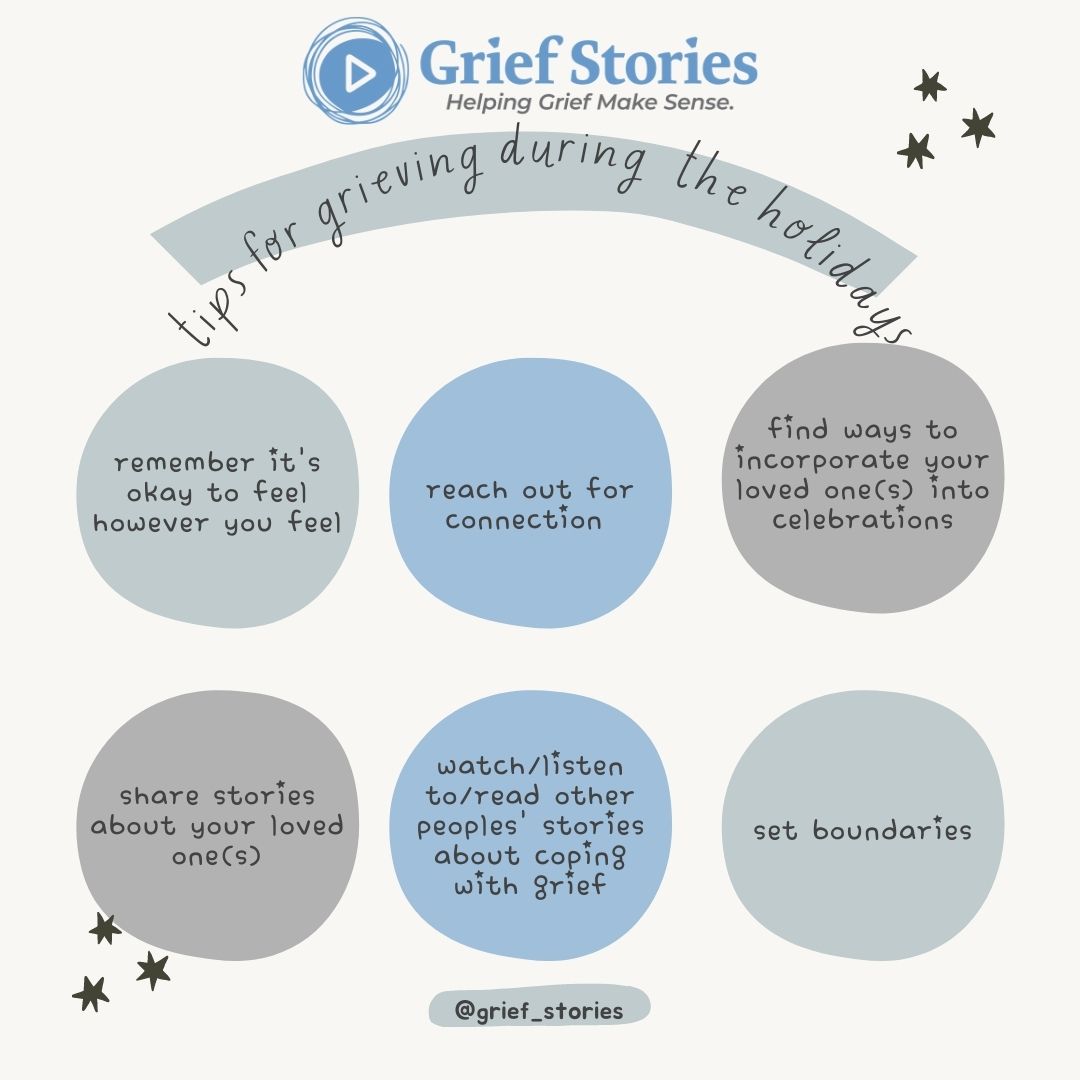Posts Tagged ‘Boundaries’
Tips for Grieving During the Holidays
By Alyssa Warmland
The holidays can bring up a lot of feelings, especially when you’re grieving the loss of a loved one. Whether it’s the first holiday season without someone, the holidays mark a time where someone you love died, or it’s just hard to be around celebration when you’re not feeling celebratory, December can feel heavy.
These are a few tips for grieving during the holidays:
Remind yourself that it’s okay to feel however you feel.
Feeling sad or mad? Feeling happy- and guilty for not feeling worse? Whatever comes up for you is normal. It’s okay to sit with your feelings, to give them some space when it feels right, and also to compartmentalize them if you feel like that’s best in the moment. You can acknowledge your feelings, put them in your pocket, and hold on to them during the family dinner if you want to. You can take them out of your pocket and spend time with them later. Grief is unique, and can show up in unexpected ways. It’s okay to feel however you feel.
Reach out for connection.
Sometimes we worry that we’ll make someone else upset if we mention our grief, or if we show up in a way that isn’t particularly festive. The truth is, the people who care about us want to hold space for us, even when we’re grieving. Connection can help us feel better.
Find ways to incorporate your loved one(s) into celebrations.
Did your dad have a favourite side dish your family always served at dinner? Did Oma make sugar cookies every year? Did your sister always compliment you when you wore red? Consider serving dad’s dish, or baking Oma’s cookies, or wearing red.
Share stories about your loved ones.
Sometimes it can be tempting to pretend the people we love haven’t died. As if, by not talking about them, we can pretend they’re still around. In fact, sharing stories about them can help honour them and to feel their presence. Remembering our loved ones out loud in connection with other people can feel healing.
Watch/listen/read other peoples’ stories and insights about grief.
At griefstories.org , we host stories and insights from people with lived experience in grief, as well as healthcare professionals’ insights on grief. These videos, podcasts, and blog posts are available for free 24/7, anywhere you can access the internet. Our hope is that this content may help you feel less alone.
Set boundaries.
Listen to how your body feels. You don’t have to do anything you don’t want to do. You are safe and you are worthy of operating with integrity toward yourself. Grief can be hard, and it’s okay to be gentle with yourself as you move in and through it – even during the holidays. Set whatever boundaries feel right for you. There are no rules here. You’ve got this.
Learning from Grief
By Noelle Bailey
Grief is weird. Odd start, I know, but that was the sentence I used a lot whenever someone asked me how I was. It was never a constant feeling; it changed day to day. And still does. It’s the full gambit of emotions from sadness to anger to guilt and, though dark, even humour found its way in.
In December of 2019, I lost my father. His health had been declining for several months, and we had started the process to diagnose and begin treatment for what we knew was probably cancer. At his first appointment with his oncologist, he was immediately admitted to the ER. By the next day he was on a ventilator, and within twelve days they came to tell me that the cancer had spread everywhere. We had lost a fight we hadn’t even really begun. In March of 2022, my mother passed away after a 14 year fight with MS. It was a much different process to lose her by degrees over those 14 years, witnessing her own body turn against her while powerless to do anything to stop it.
Those are my two experiences with the strangeness of grief. They were vastly different experiences, but also similar in that they cut me in two and changed my life.
The two biggest things I’ve taken from my grieving process are these:
1. I will, for the rest of my life, miss the conversations we will never have. There are books I’ve read since they left that I would love to talk to my mom about. My dad never got to hear about my new job, and he would have loved it. Pictures people have brought me that I can never ask them about, stories I missed out on hearing. The moments of my life, big and small, that they won’t be here for is the part that takes me under every time.
2. I can grieve however I need to. It doesn’t need to look a certain way or be anything other than what I need. I struggled a lot after losing my mom with the idea that I wasn’t sad enough or broken enough because after watching her long hard battle there was a certain peace lacing itself through the pain. When we laid my parents to rest in the cemetery next to my grandparents, we played “The Rainbow Connection” sung by Kermit the Frog because that’s what my mom had always said she wanted to play to say goodbye. Then my husband, Cale, and I did a shot of Jack, like my dad and Cale did when they went out for my dad’s 60th.
I’ve never been very good at setting boundaries in my life, but I tried very hard to make sure I set them surrounding my grief. To let myself do whatever I needed to process the loss of my parents and not to let anyone tell me I should be acting or feeling a certain way. I laughed at things they would have laughed at, and when I needed to, I cried. I am slowly learning how to live in a world without my parents, and know that I will be for the rest of my life.
Brenda and Dale – “Being self aware”
Brenda and Dale – “Being self aware”
Brenda and Dale talk about self care. They continue to grieve the death of their son by suicide.
Brenda and Dale – “Returning to Work”
Brenda and Dale – “Returning to Work”
Brenda and Dale discuss their experiences going back to work. They continue to grieve the death of their son by suicide.
Keith – “Disenfranchised Grief”
Keith – “Disenfranchised Grief”
Keith describes disenfranchised grief.


